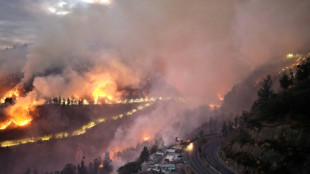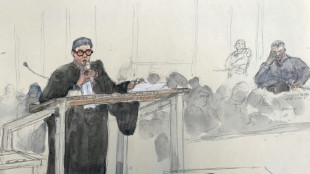
-
 Countrywide air alert in Ukraine due to missile threat
Countrywide air alert in Ukraine due to missile threat
-
China's military corruption crackdown explained

-
 Primark boss defends practices as budget fashion brand eyes expansion
Primark boss defends practices as budget fashion brand eyes expansion
-
Williamson eyes ton as New Zealand take control against England

-
 Norway faces WWF in court over deep sea mining
Norway faces WWF in court over deep sea mining
-
Trump, Sheinbaum discuss migration in Mexico amid tariff threat

-
 Asian markets mixed after subdued pre-holiday shift on Wall St
Asian markets mixed after subdued pre-holiday shift on Wall St
-
Orban's soft power shines as Hungary hosts Israeli match

-
 'Retaliate': Trump tariff talk spurs global jitters, preparations
'Retaliate': Trump tariff talk spurs global jitters, preparations
-
'Anti-woke' Americans hail death of DEI as another domino topples

-
 Trump hails migration talks with Mexico president
Trump hails migration talks with Mexico president
-
Truckers strike accusing Wagner of driver death in Central African Republic

-
 London police say 90 victims identified in new Al-Fayed probe
London police say 90 victims identified in new Al-Fayed probe
-
Air pollution from fires linked to 1.5 million deaths a year

-
 Latham falls for 47 as New Zealand 104-2 in first England Test
Latham falls for 47 as New Zealand 104-2 in first England Test
-
US tells Ukraine to lower conscription age to 18

-
 Judge denies Sean Combs bail: court order
Judge denies Sean Combs bail: court order
-
Suarez extends Inter Miami stay with new deal

-
 Perfect Liverpool on top of Champions League, Dortmund also among winners
Perfect Liverpool on top of Champions League, Dortmund also among winners
-
Liverpool more 'up for it' than beaten Madrid, concedes Bellingham

-
 Aston Villa denied late winner against Juventus
Aston Villa denied late winner against Juventus
-
Mexico president hails 'excellent' Trump talks after US tariff threat

-
 Leicester set to appoint Van Nistelrooy - reports
Leicester set to appoint Van Nistelrooy - reports
-
Coffee price heats up on tight Brazil crop fears

-
 Maeda salvages Celtic draw against Club Brugge
Maeda salvages Celtic draw against Club Brugge
-
Villa denied late winner against Juventus

-
 Dortmund beat Zagreb to climb into Champions League top four
Dortmund beat Zagreb to climb into Champions League top four
-
Mbappe misses penalty as Liverpool exact revenge on Real Madrid

-
 Brazil's top court takes on regulation of social media
Brazil's top court takes on regulation of social media
-
Thousands still queuing to vote after Namibia polls close

-
 Trump taps retired general for key Ukraine conflict role
Trump taps retired general for key Ukraine conflict role
-
Canadian fund drops bid for Spanish pharma firm Grifols

-
 Argentine ex-president Fernandez gives statement in corruption case
Argentine ex-president Fernandez gives statement in corruption case
-
Mexico says Trump tariffs would cost 400,000 US jobs

-
 Car-centric Saudi to open first part of Riyadh Metro
Car-centric Saudi to open first part of Riyadh Metro
-
Brussels, not Paris, will decide EU-Mercosur trade deal: Lula

-
 Faeces, vomit offer clues to how dinosaurs rose to rule Earth
Faeces, vomit offer clues to how dinosaurs rose to rule Earth
-
Ruby slippers from 'The Wizard of Oz' up for auction

-
 Spain factory explosion kills three, injures seven
Spain factory explosion kills three, injures seven
-
US Fed's favored inflation gauge ticks up in October

-
 Defence lawyers plead to judges in French mass rape trial
Defence lawyers plead to judges in French mass rape trial
-
US says China releases three 'wrongfully detained' Americans

-
 New clashes in Mozambique as two reported killed
New clashes in Mozambique as two reported killed
-
Romania officials to meet over 'cyber risks' to elections

-
 Chelsea visit next stop in Heidenheim's 'unthinkable' rise
Chelsea visit next stop in Heidenheim's 'unthinkable' rise
-
Former England prop Marler announces retirement from rugby

-
 Kumara gives Sri Lanka edge on rain-hit day against South Africa
Kumara gives Sri Lanka edge on rain-hit day against South Africa
-
Namibia votes with ruling party facing toughest race yet

-
 Spurs goalkeeper Vicario out for 'months' with broken ankle
Spurs goalkeeper Vicario out for 'months' with broken ankle
-
Moscow expels German journalists, Berlin denies closing Russia TV bureau


'A heart of love': Kinshasa locals reward honest cops
At dawn in a working-class district of Kinshasa, a driver slows to a halt and hands a fistful of small bills to a traffic cop.
The sight is common in the Democratic Republic of Congo's bustling capital, where ill-paid officers are notorious for shaking down commuters.
But unlike some of her less scrupulous colleagues, police officer Celine Bakindo had solicited no money. The driver had simply stopped to give her a tip for doing her job.
"People like me a lot," said Bakindo, wearing a beret, white gloves and a fluorescent orange vest over her navy-blue uniform.
"They give me lots of presents."
Traffic cops in the megacity of 15 million have an entrenched image for corruption.
It's not uncommon for them to leap inside a car to accuse the driver of an imaginary infraction and snatch the key in the hope of extracting payment. Police are even known to rip off license plates during traffic stops.
Public disillusionment with the force is deep enough that a practice has developed that, elsewhere in the world, may seem paradoxical: people give money to police who are straight.
In Kinshasa, honest traffic cops are city institutions -- word of their integrity swiftly spreads through conversations or on social media, and many reap rewards in tips as a result.
After Bakindo mounts a platform in the middle of her busy intersection, she smiles as she directs swarms of motorbikes and decrepit collective taxis to their destinations.
Another motorist slows down to offer her money in the space of a few minutes.
Locals, long accustomed to police harassment, said they appreciate her commitment to work and her honesty.
"She is really super," said Patient Kanuf, a 32-year-old motorbike-taxi driver refuelling near Bakindo's intersection.
"She has a heart of love."
- Impunity -
At another intersection in the city centre, a tall and soft-spoken police captain with heavy black spectacles has also become a local celebrity for incorruptibility.
Jean-Pierre Beya, 64, has stood under the sun at the same junction for about 15 years, smiling genially at commuters as they crawl past in late-afternoon traffic.
Drivers who surge dangerously across the intersection earn a finger-wag and a stern talking-to.
Isaac Woto, a nearby taxi driver, said that both Beya and Bakindo are known across Kinshasa.
"They're serious" about their jobs, said the 45-year-old. "The others, they're just looking for money."
Corruption is an engrained problem in the DRC.
A vast country the size of continental western Europe, it ranks a lowly 169th out of 180 nations in the 2021 Corruption Perceptions Index by the NGO Transparency International.
Researchers from the University of Chicago, Antwerp University, the Universite Catholique du Congo and Congolese organisation Marakuja Kivu Research delved into the issue of Kinshasa's traffic cops.
Around 80 percent of their income came from bribes, the team say in a study due to be published next week by the US-based National Bureau of Economic Research (NBER).
Looking at more than 15,000 interactions between drivers and police, the researchers concluded that the bribery was codified into a system -- cops had to achieve a quota of kickbacks.
In 2015, according to their calculation, bribes raised an average of $12,120 per month per police station.
A traffic officer, who spoke to AFP on condition of anonymity, denied that soliciting bribes was routine, but admitted that there was impunity for senior police officers and politicians who drove dangerously.
A spokesman for the Congolese national police did not respond to requests for comment.
- 'For the republic' -
The unsolicited tips that AFP saw changing hands appeared to range from the equivalent of 50 US cents to a few dollars.
Such sums can be significant in a country where nearly three-quarters of the population of 90 million lives on under $1.9 a day, according to World Bank figures.
Official police salaries are very low, with the lowest-ranked traffic cop earning about $100 a month, said Beya.
But he dismissed the notion that poverty was what prompted some of his colleagues to shake drivers down.
"We're all on the same salary," the captain said, as he took a break in the shade.
"The problem is mentality," he said. "I work for the republic."
Locals seemed to cherish Beya, offering him tips and saluting or bowing as they passed by.
Beya, like Bakindo, said accepting tips was within the rules.
"It's not corruption," Beya said, explaining that gifts do not affect his impartiality.
"If you do things with respect and courtesy, you'll get something in return."
C.Kovalenko--BTB


